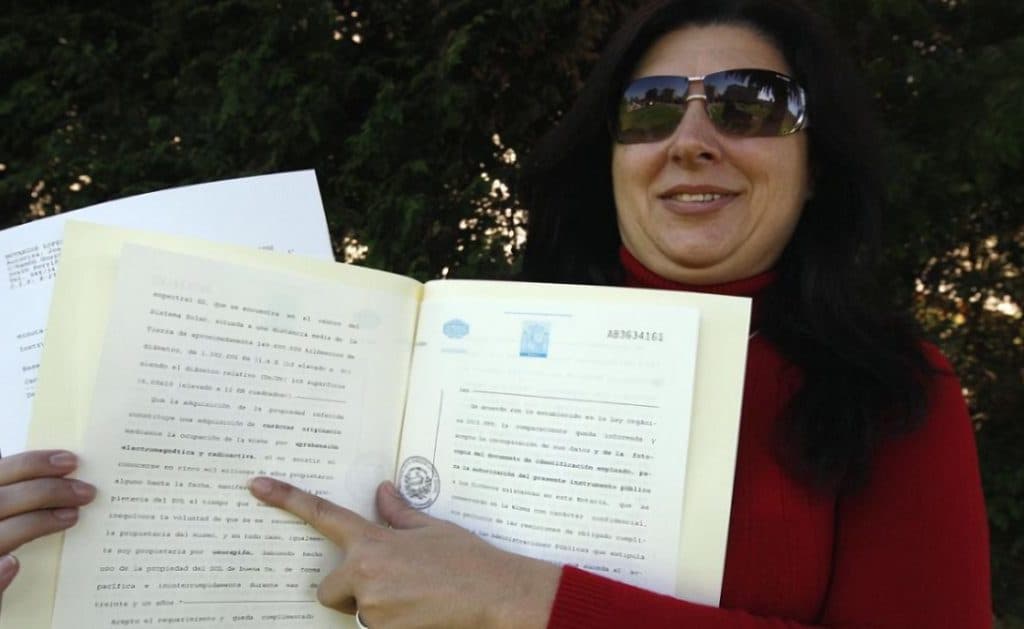In a universe where the sun shines indiscriminately on everyone, a narrative emerges that defies the unimaginable. Ángeles Durán dares to claim ownership of the Sun, the majestic celestial body that has bathed the Earth in light and warmth since the dawn of our existence.
When the Sun Stopped Being Everyone’s: The Story of Ángeles Durán
This isn’t a science fiction plot but a reality starring Ángeles Durán, a Spanish woman who asserts she’s the rightful owner of the Sun.
Her claim has not only captured the attention of the media and legal experts but also sparked a debate on the legal and ethical limits of owning natural elements, or in this case, celestial bodies.
In a global context where the search for renewable energy has become crucial, Durán’s case invites reflection on international regulations and individual rights over natural resources. This story isn’t just a journey through an unprecedented claim but also a window into the potential future implications of such claims.
Celestial Ownership: Durán’s Unusual Path to Becoming the Owner of the Sun
Ángeles Durán, originally from Vigo, has undertaken one of the most singular actions in recent legal history. Her feat begins with a visit to a local notary, where she declares herself the owner of the Sun. The foundation of her claim is based on a surprising legal loophole: while there’s an international agreement that prohibits countries from claiming ownership of celestial bodies, it does not mention individuals.
In this context, Durán argues that, since an American has already claimed most of the planets and the Moon but left out the Sun, she could legally make it her own.
Acting on this premise, she went to the notary, who, after overcoming initial surprise and consulting with the corresponding Professional College, proceeded to draft the deed that would recognize Durán as the owner of the Solar King.
The document details that the property is acquired by “electromagnetic and radioactive apprehension,” a concept that might seem like science fiction but, in this case, serves as the basis for an unprecedented property claim. Durán declares herself the owner of the Sun by adverse possession, claiming peaceful and uninterrupted possession for over 31 years.
This process stands out not only for its originality but also for the debate it sparks about the nature and limits of ownership. Durán’s action opens a range of questions about what is truly possible to own and under what conditions, challenging our traditional conceptions of property and the use of natural and celestial resources.
Beyond Legal: The Ethical Dilemmas of Claiming the Sun
Ángeles Durán’s claim to ownership of the Sun has generated widespread discussion that transcends legal realms to delve into ethical and moral territories. The idea that an individual could claim a celestial body essential for life on Earth, and a significant source of renewable energy, raises questions about the foundations of our laws and moral principles.
Legally, Durán’s case highlights the gaps in international regulations regarding the ownership of elements beyond our planet.
Although the Outer Space Treaty, adopted by the United Nations in 1967, states that outer space, including the Moon and other celestial bodies, cannot be claimed by national appropriation by claim of sovereignty, use or occupation, or by any other means, it doesn’t explicitly mention individual ownership. This legal loophole has allowed Durán, at least in theory, to claim ownership of the Sun.
From an ethical perspective, Durán’s intention to charge for the use of solar energy opens up a debate about the fairness and equity of monetizing essential natural resources. While she proposes a distribution of hypothetical income for charitable purposes, including minimum pensions and health research, the idea of privatizing something as fundamental and universally shared as sunlight clashes with principles of equitable access to natural resources.
This situation invites reflection on the scope of private property and its relationship with the common good. While the law may provide mechanisms to claim possession of goods and resources, ethics urge us to consider the broader implications of such acts, especially when they affect elements fundamental to collective well-being.
Reflections Under the Sun: The Future of Our Resources
The unique story of Ángeles Durán and her claim to the ownership of the Sun isn’t just a curious episode in legal history. It represents a starting point for a broader discussion about the limits of ownership, the management of natural resources, and the future of regulation concerning outer space.
In a world where the exploitation of celestial resources is no longer the stuff of science fiction but an imminent possibility, Durán’s case takes on unexpected relevance.
This debate goes beyond the anecdote to pose fundamental questions about our common future. How will we regulate the use of resources that, by their nature, belong to everyone and no one at the same time?
Solar energy, like the air we breathe, is an essential resource that has been free from the constraints of private property. However, Durán’s initiative reminds us that our laws and international agreements may need to adapt to new realities.
Reflection on this case should not focus solely on the legal viability of the claim, but also on the message it sends about the need to preserve certain goods for the common benefit.
As we move toward the future, it’s essential that our legal and ethical decisions reflect a commitment to sustainability, equitable access, and the protection of natural and celestial resources for present and future generations.
The challenge posed by Ángeles Durán, beyond its peculiarity, is an invitation to collectively think about how we approach the ownership and management of common goods in an era of unprecedented technological possibilities.
The story of the “owner of the Sun” doesn’t end here; in fact, it’s just beginning to shed light on the numerous dilemmas we will face on our path to the future.





